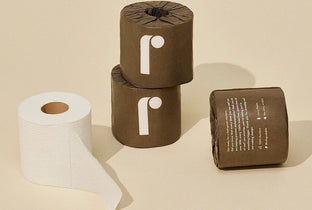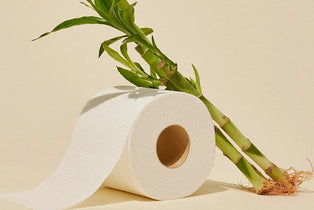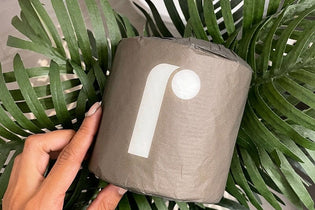
TLDR
Whether as part of your sustainable New Year's Resolutions or a change you’ve long been considering, embarking on a journey toward a more sustainable lifestyle often begins at home. Simple swaps can significantly reduce our environmental footprint, and with a new year just around the corner, it's the perfect time to embrace eco-friendly changes. This comprehensive guide offers practical and sustainable swaps for various aspects of home life, helping you contribute to a healthier planet. Let's explore how small changes, like choosing Reel Paper's eco-friendly products, can make a big difference.
Swap Beef for Plant-Based Proteins
Reducing meat consumption, particularly beef, can have a profound impact on reducing your carbon footprint. Plant-based proteins like beans, lentils, and tofu are not only nutritious but also require fewer resources to produce than meat, resulting in lower greenhouse gas emissions.
This can help mitigate the environmental impact of meat consumption, which is responsible for a significant portion of greenhouse gas emissions.
Incorporating these alternatives into your diet can lead to a significant reduction in your environmental impact, while also promoting better health. They are rich in essential nutrients and can be prepared in a variety of delicious ways, making them an enjoyable part of any meal.
Homemade Meals Over Takeout
Cooking at home can significantly reduce packaging waste compared to takeout or delivery meals, as it allows for healthier and more controlled cooking methods, reducing the consumption of preservatives and unhealthy fats. Preparing meals at home fosters a deeper understanding of food and its origins, and can become a cherished activity for family bonding and sharing culinary traditions. Some benefits of cooking at home include:
- Reduced packaging waste: Takeout and delivery meals often use excessive packaging, which contributes to waste. Cooking at home allows you to control the amount of packaging used, such as reusing containers or choosing eco-friendly alternatives.
- Healthier cooking methods: Home-cooked meals often involve healthier cooking methods, such as steaming, baking, or grilling, which can reduce the use of preservatives and unhealthy fats, which also end up in landfills as food waste.

Composting Food Waste
Speaking of food waste, starting a compost bin is an eco-friendly way to recycle organic waste into nutrient-rich soil, reducing landfill waste and promoting healthier plant growth. Compost bins come in various shapes and sizes, and are made using different materials such as plastic, wood, or metal. Plastic compost bins are ideal for small spaces, while wooden compost bins are typically modular and can produce hundreds of liters of compost. Hot compost bins are insulated with a close-fitting lid, making them ideal for colder climates.
To start a compost bin, simply put garden and kitchen waste into the bin and let it break down over time. Composting is an excellent way to witness the cycle of nature firsthand and understand the value of repurposing organic materials, turning what would be waste into a valuable resource for gardening
Zero-Waste Kits
Investing in a zero-waste kit is an effective way to reduce reliance on single-use plastics and disposables. A zero-waste lifestyle helps conserve natural resources and reduce pollution, creating a cleaner and healthier planet.
Zero-waste kits typically include reusable water bottles, cloth napkins, and produce bags. These kits are practical and symbolize a commitment to a more mindful and eco-conscious way of living. Zero-waste kits can be customized to suit individual needs and preferences, and can be purchased pre-made or assembled at home using items that are already available.
Choose Experiences Over Material Gifts
Opting for experiences rather than material gifts reduces waste and can create more meaningful, memorable moments. Consider gifting tickets to events, or classes, or donating to a charity in someone's name. Experiences foster connections and memories that last far longer than most physical gifts, and they're an opportunity to explore new interests and passions.
This approach also encourages a more minimalist and mindful lifestyle, focusing on the richness of experiences rather than accumulating possessions. By choosing experience-based gifts, you not only contribute to a less cluttered and more sustainable world but also offer a unique and personal touch that can deepen relationships and create lasting joy.
Secondhand Shopping
Buying used items not only saves money but also reduces demand for new products, consequently decreasing overall production emissions. Thrift stores, garage sales, and online marketplaces are great places to find quality secondhand goods. Shopping secondhand is an excellent way to find unique items and contribute to a circular economy, reducing the overall environmental impact of consumer goods.
In a circular economy, products are designed and sold in such a way that they are used for longer and can maintain their value. Secondhand consumption of clothing, for example, can support the transition to circular economies by prolonging the lifespan of products through reuse.
Invest in Quality, Durable Products
Purchasing high-quality, durable products may cost more upfront but usually saves money and reduces waste in the long run. Look for items with good warranties and robust build quality. Investing in durable products not only means less frequent replacements but also less waste ending up in landfills, making it a smart choice for both your budget and the environment.
Additionally, durable products often perform better and provide a higher level of satisfaction, enhancing your daily life. When you invest in quality, you're also often supporting businesses that prioritize craftsmanship and ethical production practices, further contributing to a more sustainable economy. This shift in the purchasing mindset from disposable to long-lasting can significantly impact the reduction of overall consumption and waste.
DIY Cleaning Supplies
Making your own cleaning supplies from natural ingredients like vinegar, baking soda, and essential oils reduces the need for harsh chemicals and plastic packaging. It’s a healthier choice for your home and the environment. DIY cleaning supplies can be just as effective as store-bought ones and offer a way to personalize your home care routine while reducing your ecological footprint. For example, a simple mixture of vinegar and water can be a potent all-purpose cleaner, while baking soda is great for scrubbing tough stains. These homemade solutions are not only eco-friendly but also cost-effective, reducing the need to purchase multiple, often expensive, commercial products. Additionally, using natural ingredients can improve indoor air quality by reducing the presence of synthetic fragrances and chemicals.
Natural Cleaning Tools
Swap out plastic cleaning tools for natural alternatives like wooden brushes, loofahs, or Swedish dishcloths. These options are more sustainable and can often be composted after their life cycle. Not only are they environmentally friendly, but they also add a touch of natural aesthetics to your home and can be more pleasant to use than their plastic counterparts. Using materials like bamboo for brushes and organic cotton for cloth can significantly reduce the amount of plastic waste generated from cleaning tools.
Additionally, these natural materials are often more durable and effective at cleaning, offering a superior, eco-friendly alternative to synthetic options. By choosing natural cleaning tools, you're not only making a positive impact on the environment but also investing in products that are safer for your home and family.
Use Eco-Friendly Household Paper Products
Switching to Reel Paper's bamboo toilet paper and recycled paper towels can greatly reduce your environmental impact. These products are not only sustainable but also free from the plastic packaging that accompanies many traditional paper products. Reel Paper’s commitment to eco-friendliness extends to its entire production process, ensuring that its products are not only better for the environment but also safe and comfortable for your family.
Bamboo, as a rapidly renewable resource, offers a more sustainable alternative to traditional wood pulp, and using recycled materials helps to reduce waste and conserve natural resources. Additionally, Reel Paper's products are designed to be both soft and strong, proving that choosing environmentally responsible products doesn’t mean compromising on quality or worrying about why bamboo toilet paper is so expensive when it’s far from it. By incorporating these sustainable paper products into your home, you are taking an easy yet effective step towards a more eco-conscious lifestyle.

Glass or Beeswax Food Storage
Beeswax wraps are a sustainable and eco-friendly alternative to plastic for food storage. They are reusable, free from harmful chemicals found in some plastics, and provide a clear view of the contents. Beeswax wraps are made from organic cotton and beeswax, and they have a double-stitched seam, making them a perfect replacement for plastic zip-top bags. They can be used to cover bowls, wrap sandwiches, or store fruits and vegetables, and they help keep food fresh to reduce food waste and carbon emissions. Beeswax wraps are durable and, with consistent use and proper care, can last anywhere from 6 months to a year. They are also biodegradable, and when they reach the end of their life, they can be simply thrown into the compost.
Glass containers are another sustainable option for food storage. They maintain the integrity of food better, keeping it fresher for longer periods. They are suitable for storing a variety of food items and are reusable, making them an eco-friendly choice. When looking for sustainable alternatives, it's important to consider the material, reusability, and end-of-life disposal of the products. Both beeswax wraps and glass containers contribute to reducing the environmental impact of food storage and promoting a cleaner and healthier planet.
Recycle in Every Room
Recycling shouldn't be limited to the kitchen. Extend your recycling efforts to every room, including the bathroom, where items like toilet paper rolls and certain plastic packaging can often be recycled. By placing designated recycling bins in each room, you encourage the habit of recycling among all household members, ensuring that more waste is properly repurposed and kept out of landfills.
Familiarizing yourself with local recycling guidelines can also help maximize the effectiveness of your efforts, as different materials require different handling. In spaces like home offices or bedrooms, pay attention to items like paper, old electronics, and batteries, ensuring they’re disposed of responsibly. This comprehensive approach to recycling can significantly increase the amount of waste diverted from landfills and is a key step in fostering a more sustainable household.
Eco-Friendly Laundry Detergent
Choosing sustainable laundry detergents can reduce the release of harmful chemicals into waterways and is gentler on clothes and skin. Eco-friendly detergents are often plant-based and biodegradable, and they come in sustainable packaging, further reducing their environmental impact.
When shopping for eco-friendly laundry detergents, it's important to look for ingredients that are biodegradable and come from renewable sources, like plants. Eco-friendly detergents may also omit ingredients like brighteners, artificial preservatives, and dyes. Additionally, it's important to consider the packaging of the detergent and whether it can be recycled or is made from recycled or compostable materials
Sustainable Sleep with Green Pillows
Opt for eco-friendly bedding options like pillows made from organic cotton or bamboo fibers. These materials are not only sustainable but also offer comfort without the chemical treatments found in conventional bedding. They are hypoallergenic and breathable, ensuring a healthier and more comfortable sleep. The right green pillows often come with certifications like GOTS (Global Organic Textile Standard), ensuring they meet strict environmental and social criteria throughout their production process.
Choosing sustainable sleep products like these not only improves your sleep quality but also supports the environment by reducing the demand for synthetic materials and the pollution associated with their production. Moreover, by opting for eco-friendly pillows, you contribute to a market that values sustainability, encouraging more companies to consider environmentally conscious practices in their manufacturing processes.
Biodegradable Personal Care Products
Incorporate biodegradable personal care products, such as shampoo bars and bamboo toothbrushes, into your daily routine. These products reduce plastic waste and are often made with natural ingredients that are better for your health. Switching to biodegradable options means these products will break down naturally once disposed of, significantly reducing their impact on the environment.
This switch not only minimizes your contribution to landfill waste but also helps avoid polluting waterways with microplastics and harsh chemicals typically found in conventional personal care products. Many of these eco-friendly products also usually come in minimal or recyclable packaging, further reducing their environmental footprint. Embracing biodegradable personal care products is an easy yet effective way to make your daily routine more sustainable and gentle on the planet.
![]()
Eco-Friendly Period Products
Sustainable menstrual products like reusable pads, menstrual cups, or organic cotton tampons can significantly reduce the waste generated from conventional period products. These eco-friendly alternatives not only benefit the environment but can also be more cost-effective and comfortable in the long run.
Reusable options like menstrual cups or cloth pads also have a much longer lifespan, drastically decreasing the need for frequent purchases. Additionally, organic cotton products are free from pesticides and bleaches, making them a healthier choice for your body. Embracing these sustainable period products is a powerful way for individuals to make a positive environmental impact in a frequently overlooked area of personal care.
Making the Change with Reel Paper
Embracing a sustainable lifestyle is made easier with companies like Reel Paper, which offers eco-friendly alternatives for everyday essentials. Our bamboo toilet paper, recycled paper towels, and recycled facial tissues are designed to provide a green solution for the need for household paper products. By opting for Reel Paper products, you're not only making a sustainable choice but also supporting a brand committed to environmental responsibility and reducing plastic waste. Every swap counts, and with Reel Paper, you can ensure that your choices are contributing to a healthier, more sustainable world without having to reconsider how much toilet paper to use. Remember, sustainability is a journey, and every small step towards eco-friendly living makes a difference. Let's embrace these sustainable swaps and work towards a greener, more sustainable future, one choice at a time.
Remember, sustainability is a journey, and every small step towards eco-friendly living makes a difference. Let's embrace these sustainable swaps and work towards a greener, more sustainable future, one choice at a time.
Sources:
- Consumer Acceptance of Plant-Based Meat Substitutes: A Narrative Review By János Szenderák, Dániel Fróna, Mónika Rákos Container: Foods Publisher: Multidisciplinary Digital Publishing Institute Year: 2022 Volume: 11 Issue: 9 DOI: 10.3390/foods11091274 URL: https://www.ncbi.nlm.nih.gov/pmc/articles/PMC9102955/
- Perspective: Plant-Based Meat Alternatives Can Help Facilitate and Maintain a Lower Animal to Plant Protein Intake Ratio By Mark Messina, Alison Duncan, Andrea J Glenn, François Mariotti Container: Advances in Nutrition Publisher: Elsevier BV Year: 2023 Volume: 14 Issue: 3 DOI: 10.1016/j.advnut.2023.03.003 URL: https://www.ncbi.nlm.nih.gov/pmc/articles/PMC10201680/
- 5 Practical Ways to Reduce Food Packaging Waste By Campus Environmental Center Year: 2019 URL: https://utenvironment.org/2019/03/22/5-practical-ways-to-reduce-food-packaging-waste/
- The best compost bins in 2023 By Alex David Container: Gardenersworld.com Publisher: BBC Gardeners World Magazine Year: 2023 URL: https://www.gardenersworld.com/reviews/gardening-kit/which-type-of-compost-bin-is-best/
- Back for Seconds: The Role of Second Hand in the Circular Economy | Blog | BehaviourWorks Australia By Milly Graham Container: Behaviourworksaustralia.org Year: 2024 URL: https://www.behaviourworksaustralia.org/blog/back-for-seconds-the-role-of-second-hand-in-the-circular-economy
- Second-hand clothing markets and a just circular economy? Exploring the role of business forms and profit By Ola Persson, Jennifer Hinton Container: Journal of Cleaner Production Publisher: Elsevier BV Year: 2023 Volume: 390 DOI: 10.1016/j.jclepro.2023.136139 URL: https://www.sciencedirect.com/science/article/pii/S0959652623002974
- Beeswax Wraps and Sustainable Alternatives By Sustainability Office Container: The Green Dandelion Year: 2023 URL: https://blogs.rochester.edu/thegreendandelion/2023/08/beeswax-wraps-and-sustainable-alternatives/
- The Standard - GOTS By Global-standard.org Year: 2023 URL: https://global-standard.org/the-standard




0 comments